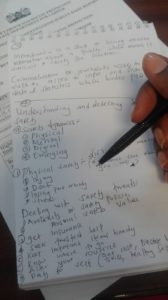Groundbreaking Workshop on AI and Technology-Facilitated Gender-Based Violence at AWiM24
Trending
Saturday May 31, 2025
Trending

Safety especially journalist safety is very vital in this day and age we find ourselves. The corona virus pandemic has heightened the already present need for safety of journalists and now more than ever, journalists who are at the war front with health care workers deserve to be safe. Journalists in a bid to bring to light the accompanying effects of the virus on the economic and social health of the nation, have exposed themselves to various risks and challenges. Hence, the need to bring to their consciousness the mantra ‘Safety first’.
In addressing safety, both online and offline safety ought to be taken care of in order to ensure efficiency of reporting. Female journalists have been at the short end of the stick in terms of safety, from harassment at work, to insecurity threats and online trolls. The female journalist just can’t catch a break. The social construct of the environment we find ourselves has created the image of the female as being weak in the eyes of everyone around her, hence, the notion that she can be intimidated into silence or worse constant fear. The module on safety has provided a way to avoid being put in such precarious situation as a participant noted;
“💪🏽🎷🎷 one course done! I like the safety of journalists’ course because it touches on current and future issues, it made me think of how careless I have been. No following the same route or parking the same place daily.”
This necessitated the need for a safety course, this course designed by Ms. Vicensia Fuko for the Risk Communication and Community Engagement project which is done in partnership with UNESCO under the framework of the IPDC. The course, designed to educate and enlighten participants on the various safety risks within their offline and online community has received positive reviews from participants and caused a major eye opening as it showed participants just how vulnerable they have been. In light of this, participants had these to say;
“Just done with module five on safety of Journalists! Indeed as the trainer Fuko says. We’ve got work to do. Imagine the Cyber-crimes law used by the state and enforcers against female Journalists and not in their defence🙆. There is really need to focus on shifting cultural norms so that social attacks become unacceptable! You and I know this is quite an uphill task but together we can 👍🏼”
“So interesting have completed one course on safety, now I know how to come up with a strong password/situation awareness before going to field,so greatful, yesterday was tedious, complicated but today was successful”
In dissecting online safety, Ms. Fuko stressed on the need for stronger passwords on mobile devices and online profiles. She further stressed on the importance of keeping a low profile both online and offline in the field. She noted that journalists ought to try blending in when covering news events in places outside their station to avoid unwanted attention to themselves, this she termed as “fitting-in”. On keeping a low profile online, journalists ought to determine the kind of information they post on their socials to avoid it being used by people with an intent to harm them due to the risky nature of the job. These kind of information includes but not limited to; information on their immediate family like pictures and other personal details, their current location through the use of check in features on most social networking sites like facebook and instagram, facts or details about them that was used in the creation of their passwords to make it difficult for hackers to guess these passwords etc.
We’re not gonna spam. We’ll try at least.

Copyright 2020. African Women In Media
Copyright 2020. African Women In Media
Recent Comments